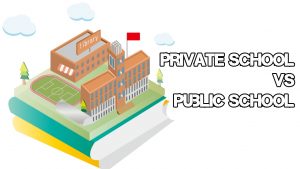Public and Private Schools, Which is better: The education of a child, and indeed, the entire nation is the responsibility of all. An educated population is key and paramount to the growth of that nation. For the actualization of this – education of the nation – schools are built and equipped with facilities to cater for the education needs of the nation.
As pointed out earlier, education is the responsibility of everyone in the country. The government and private citizens are involved in educating the population. Schools are built by the government as well as private citizens. The schools owned by the government are known as public schools while that owned by private citizens are known as private schools.

As is always the case when different things are in operation, there have been endless comparisons between the revelance, usefulness and effectiveness of public owned school vis-a-vis private owned schools. The debate as to which is better have taken a centre stage especially in a developing nation like Nigeria.
In more advanced nations, this debate might not be necessary any longer as the quality of services rendered by both public schools and private schools are basically the same. But in a developing nation, there still exists that need for such comparisons. Maybe, it will get to a time when these comparisons will not be necessary, but for the now, we shall make recourse to the various advantages and disadvantages of public schools and private schools.
Recommended: Advantages and Disadvantages of An Unwritten Constitution
Advantages (Pros) and Disadvantages (Cons) Public Schools
Public schools are government owned schools. One of the core purposes of government is the provision of quality education for the citizenry and this include the building of schools and vocational centres for the training of citizens. The government has the capacity to fund education via its budgets. This makes public schools relatively cheap and inexpensive to access. Public schools are affordable. The poor and the rich members of the society can afford public schools.
Again, public schools have a retinue of qualified and experienced teachers. This is obvious from the fact that the government has the capacity to pay such qualified teachers. The teachers are also specialists in their respective fields of study and as such, give out the best to the students in whatever subject or course they take.
Finally, due to the fact that public schools are funded by the government, the schools are equipped by the government with facilities that make learning enjoyable and satisfying. The government has the capacity to provide these things without much fuss. Also, public schools are mostly beneficiaries of donor agencies who either supply equipment to the schools or fund the purchase of such equipment.
However, these advantages notwithstanding, public schools are faced with a plethora of challenges which has made them less desirable. There is a popular saying in Nigeria which has it that a goat owned by the community usually dies of starvation. This appears to be the case of public schools in Nigeria. In a developing nation where corruption thrives, the funds meant for building, equipping and upgrading of public schools are usually embezzled. This leaves the schools in an ill-equipped state. Most public schools have dilapidated structures due to years of government neglect. This has affected the output coming from such schools.
Also, massive manipulation of the recruitment process of new teachers in public schools have left the school to be filled with teachers who are unqualified. This is because employment is no longer based on merit but on how well a prospective teacher knows those in charge of the recruitment process. To this end, unqualified and incompetent persons are employed as teachers.
Furthermore, the morale of teachers employed is usually killed by the government. This happens when they are being owed their salaries and other benefits and entitlements. Strikes and lockouts are prevalent in public schools since teachers more often than not protest the non-payment of their benefits. This has led to a situation where teachers do not even teach but rather go about their various businesses just to make ends meet. The interest in imparting knowledge is lost, and little can be done when passion for an activity dies.
Finally, there is little or no supervision of the activities of public schools. This accounts for the attitude of teachers and staffers employed. Since there is no proper supervision and appropriate sanctions meted out to erring employees, public schools fall short of minimum standards for schools.

Also see: Top Secondary Schools in Nigeria and their school fees
Advantages (Pros) and Disadvantages (Cons) of Private Schools
Just as the government owns schools, private individuals also establish schools for the training of citizens. One of the advantages of private schools is that there is proper supervision of the teachers employed by the school authorities. An individual who owns a school ensures that the teaching staff are supervised and that they carry out their duties as and when due. A staff cannot be found wanting in his duty and still retained. This accounts for effectiveness in the system. Thus, the quality of education received in a private school is high as the teachers put in their best to deliver such qualities due to constant supervision.
Secondly, owners of private schools do all that is within their powers to equip their schools with equipment and facilities of learning. Ownership of schools are regulated by state laws and regulations and where a private school falls short of such requirements, they are shut down by the government. This puts the owners of private schools on their toes and they do all they can to ensure that they have the needed facilities so as to escape being shut down by the government.
More so, children in private schools are discipline individually by the appropriate authorities in their schools. This is because the students are not much as in public schools and the teachers can easily control them when they are few or not much.
So, students here enjoy one-on-one attention and discipline from their respective teachers.
Private schools also have better security and provide a safer learning environment than the public ones. This is because the management may decide to put in higher measures in securing the school in order to make learning easier for their students.
But decision making in public schools are not as quick as that and the implementation must also follow due processes.
Recommended: Advantages And Disadvantages Of Investing In Real Estate
Finally, the incidence of strikes and lockouts are minimal, if not non-existent, in private schools. This is due to the prompt payment of salaries and other benefits to teachers. The pay might not be equal with that received by those in public schools, but it is regular and comes as and when due. This prevents the teachers from embarking on strike actions which in turn affects the quality of education.
However, private schools have their own shortcomings. One of such is that it is very expensive. Private schools are run as businesses and profits must be made therefrom. Fees are exorbitant and only the rich or middle class members of the society can afford private schools. The exorbitant prices are usually as a means of meeting up with their profit target.
Also, the qualifications of teachers employed by private schools may not be at par with their counterparts in public schools, especially, where the owners of such private schools are not very rich and operate the school solely for survival. They end up employing less qualified teachers to teach in the schools.
Funding of private schools is another challenge faced by private school owners. Private individuals do not have the sort of funds that are available to public schools and this affects their funding. Unless the owners are well established and financially stable, the running and administration of private schools has huge financial obligations.

Recommended: Best online universities in the world
Conclusively, public schools and private schools engage in the provision of education for citizens of a country. Both have their advantages and disadvantages. Both could be effectively run if the will power to do so is there. Public and private schools, despite their disadvantages can be properly managed to offer quality education services to the citizenry of a country.

Edeh Samuel Chukwuemeka, ACMC, is a lawyer and a certified mediator/conciliator in Nigeria. He is also a developer with knowledge in various programming languages. Samuel is determined to leverage his skills in technology, SEO, and legal practice to revolutionize the legal profession worldwide by creating web and mobile applications that simplify legal research. Sam is also passionate about educating and providing valuable information to people.
Nice compilation.